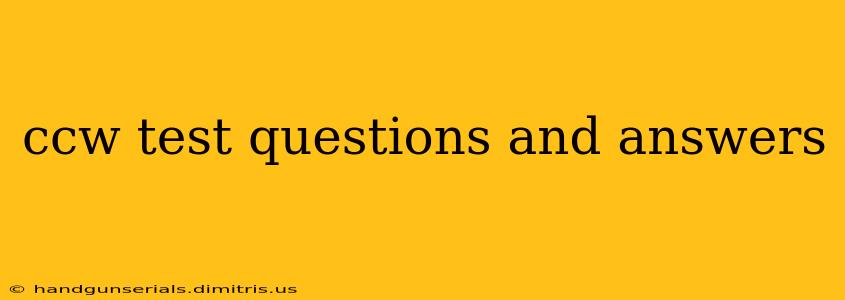Carrying a concealed weapon is a significant responsibility, demanding a thorough understanding of relevant laws and safe handling practices. This guide provides sample CCW test questions and answers to help you prepare for your concealed carry weapons permit test. Remember, laws vary significantly by state, so always consult your state's specific regulations and training materials. This information is for educational purposes only and should not be considered legal advice. Always consult with a qualified legal professional for any legal questions.
Understanding the Basics: Key Concepts for Your CCW Test
Before diving into sample questions, let's review some fundamental concepts frequently covered in CCW tests:
1. Firearm Safety:
- The Four Rules of Firearm Safety: These are paramount and almost always appear on CCW tests. Understanding and applying them is crucial.
- Proper Storage: Secure storage practices are essential to prevent accidental discharge and unauthorized access.
- Malfunctions: Knowing how to address common malfunctions (e.g., stovepipes, failure to feed) is vital for safe and effective firearm handling.
2. State Laws and Regulations:
- Concealed Carry Permits: The specific requirements for obtaining and maintaining a permit.
- Permitted Locations: Understanding where carrying a concealed weapon is legal and where it is prohibited (e.g., schools, government buildings, bars).
- Use of Force: The legal justification for using a firearm in self-defense (this often includes concepts like "duty to retreat" and "stand your ground").
3. Firearm Knowledge:
- Parts of a Firearm: Knowing the basic components of common handgun types.
- Ammunition: Understanding different types of ammunition and their characteristics.
- Cleaning and Maintenance: Proper cleaning and maintenance procedures are essential for firearm reliability.
Sample CCW Test Questions and Answers
Here are some sample questions that cover the key concepts mentioned above. Remember, these are examples, and your actual test may differ significantly based on your location.
Question 1: What is the most important rule of firearm safety?
Answer: Treat every firearm as if it were loaded.
Question 2: You are confronted by an armed attacker in a public parking lot. What is the first thing you should consider?
Answer: Your immediate safety and the safety of others. Assess the situation and determine if you can safely retreat before considering the use of force. Legal considerations regarding "duty to retreat" vary by state.
Question 3: Where are you generally prohibited from carrying a concealed weapon?
Answer: This answer will vary by state. Commonly prohibited locations include schools, government buildings, and places where alcohol is the primary business (bars, nightclubs). Always check your state's specific regulations.
Question 4: What should you do if your firearm malfunctions?
Answer: Follow the established procedures for clearing the malfunction. This will vary depending on the type of firearm and the specific malfunction. Training is crucial for handling these situations safely.
Question 5: Describe the proper way to store a firearm.
Answer: Firearms should be stored unloaded, in a locked container, and separate from ammunition, inaccessible to children and unauthorized individuals.
Question 6: What are the legal limitations on the use of force in self-defense?
Answer: The legal limitations on the use of force vary significantly by state. These often involve concepts such as proportionality (using reasonable force), the duty to retreat (in some states), and the "stand your ground" doctrine (in other states). Legal counsel should be consulted for specific clarification.
Preparing for Your CCW Test: Beyond the Sample Questions
Studying these sample questions is a good starting point, but thorough preparation requires more. Consider these additional steps:
- Take a Certified CCW Course: This is highly recommended. A reputable course provides hands-on training and covers the legal and practical aspects of concealed carry.
- Review Your State's Laws: Obtain a copy of your state's CCW regulations and carefully review them.
- Practice Safe Handling: Regular practice with your firearm is essential for developing safe and responsible handling skills. Always practice in a safe environment under the supervision of a qualified instructor.
- Understand Your Limitations: Recognize that carrying a concealed weapon comes with significant responsibility. Be aware of your limitations and never hesitate to disengage from a potentially dangerous situation if possible.
This guide provides a foundation for understanding CCW test material. However, remember to consult your state's specific requirements and seek professional training to ensure you are fully prepared and legally compliant. The information provided here is for educational purposes and should not substitute professional legal or firearms training.

